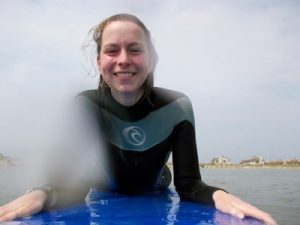When Katy Sims enters the first-year class at the UNC School of Medicine this fall, she will already have extensive medical experience. Her decision to become a doctor came as she was undergoing treatment for Ewing sarcoma, a type of childhood cancer.

Katy had just begun her freshman year at Davidson College when the tumor was found. Following a surgery to remove three ribs, she underwent 14 cycles of chemotherapy. She turned 19 two days after her surgery in November of 2007.
A dual language major, she had thought about a career as a medical interpreter, but it was a challenge from a nurse that caused her to change majors. She remembers, “This nurse had been with me at my first hospital admission and had always been there when I was having chemotherapy. She asked me what I was going to do when I finished my therapy. I said, ‘I’m going to get back to my life. Make it exactly the way it was before.’ And she asked, ‘Really? So all of this was for nothing? You’re not changing anything?’ I asked her, ‘What do you think I should change?’ And she said, ‘I think you should be a doctor.’
“I thought about it and told her at my next visit that I was going to become a doctor. I switched to a pre-med biology major. It was a difficult transition. But now I’m coming to medical school. I have worked in labs both as an undergraduate at Davidson and now at UNC in the Center for AIDS Research core imunology lab. It’s hard to say what I’ll specialize in because the only thing I’ve experienced is oncology, but I’m probably going to end up in young adult oncology.”
Katy says that being a young adult oncology patient is challenging. “It’s like a forgotten group. Video games in the pediatric ward, but not in the adult’s. This age is a major transition point in your life. Lots of times this is the first serious thing your friends have had to deal with: you being really sick or possibly dying. They’ll listen to you for a while, but then they say, ‘Okay. That’s enough. You don’t have cancer anymore.’ And I have to say, ‘You don’t understand. I’ll always have cancer. I may not have a malignancy, but I’m always going to have cancer in my life.’”
This summer she had a remarkable experience at First Descents, a national program that offers young adult cancer fighters and survivors a free outdoor adventure experience.
Her medical oncologist, Dr. Juneko Grilley-Olson, is a physician volunteer for the program. Katy says, “Dr. Grilley-Olson urged me to participate since it was one of my last free summers for a while. I was accepted to the program and from the very first day, it was like all of us had cancer and because all of us had cancer, none of us had it. The idea of First Descents is the first successful kayaking trip down a river that has never been kayaked before. For us, cancer was our first descent, the first time we had been down that river that no one else had gone down before because everyone’s cancer is such a unique experience.”
Katy describes her time in the ocean with the surfing instructors. ‘They were willing to do anything to make sure we had the experience of getting out in the waves and basically giving up our control to the ocean. After flipping over and having this enormous mass of water pouring over you, you realize that it doesn’t really matter whether or not you’re standing on the board, riding a wave or have the board under your control because the most fun is actually trying. Once you get up on the board it’s not really exciting. It’s the process of getting up on your board and learning about yourself and what does and doesn’t work and how you can actually go forward. You don’t need control to do that. You just need acceptance of yourself and acceptance of the idea that you may not end up where you want to be, but at least you got somewhere.”
Katy thinks that her cancer experience will shape her medical education for the better. “I understand what the patients are going through. I know pain, I know death, I know fear and I know illness. Many of my classmates are coming to medical school from a different point of view. I am in it for being able to take care of patients and taking care of myself by taking care of people.”
